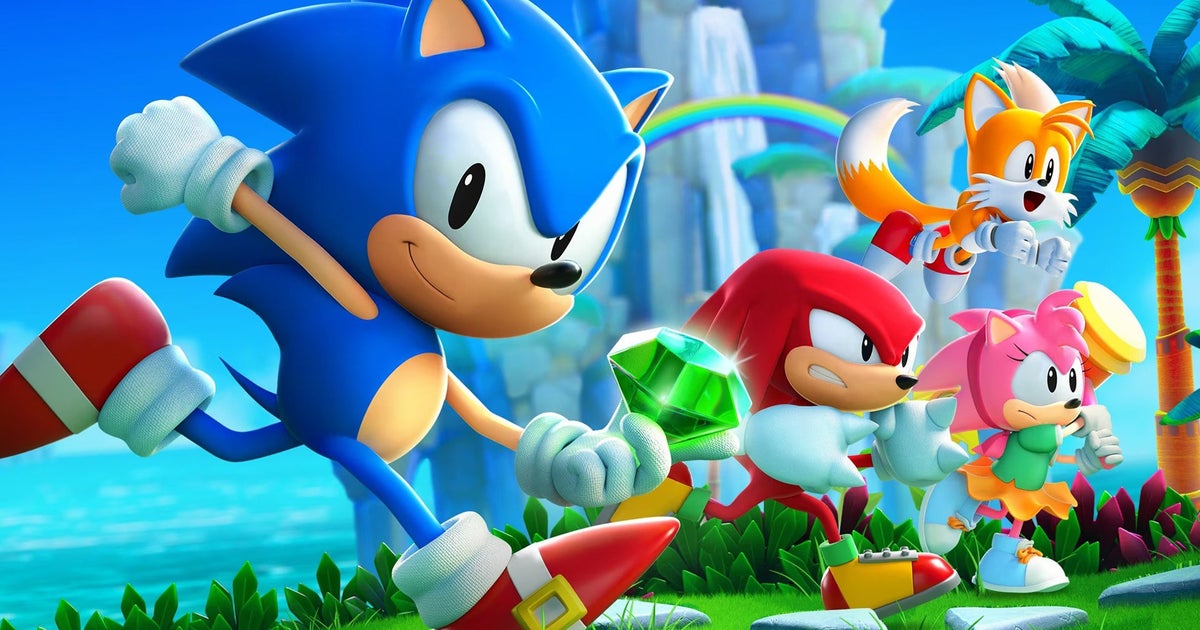John Linneman
Curated From www.eurogamer.net Check Them Out For More Content.
It’s interesting to see what Sonic Team and Arzest have come up with with Sonic Superstars – it’s a game that pays tribute to Sonic’s past while exploring new concepts along the way, but it’s also a title with some curious design choices and fascinating technical decisions. Today we’ll explore this Unity-powered platformer from both gameplay and visual perspectives while weighing in on different versions of the game across multiple platforms, including PS5, Xbox Series X/S, PC and Switch.
At its core, Sonic Superstars is a return to the classic side-scrolling Sonic formula, but constructed entirely in 3D. We’ve seen this before with varying levels of success, such as the classic Sonic stages built for Sonic Generations, but Superstars is the first title since the 16-bit era to crack the control physics conundrum that made the original 2D titles so fun to play.
These early Sonic games are known for their specific brand of acceleration and momentum – the way Sonic interacts with slopes, loops and other terrain features is key to its design. The problem is, after the shift to polygons, this aspect of Sonic was largely lost – with both 2D and 3D attempts failing to deliver anything remotely comparable to these originals.
This is why Sonic Mania from the Evening Star crew was such a revelation – Christian Whitehead and his crew perfectly nailed the feeling of Sonic and even expanded upon it with the drop dash. On release, it was the first time Sonic felt truly right since the 16-bit era.
Superstars, however, has been developed as a collaboration between Sonic Team and Arzest – a studio formed by Sonic’s character designer Naoto Oshima and other ex-Sega veterans. Alas, having worked on games such as Balan Wonderworld and Yoshi’s New Island, hopes for this new game weren’t exceptionally high – yet after playing Superstars, it’s fair to say this is the best game Arzest has ever worked on – but is it truly a great Sonic game?
The thing about movement in Sonic is that the acceleration curve, the arc of the jump and the way Sonic interacts with slopes all work in tandem to create something that’s fun to play. Of course, controls are not the only element – a great side-scrolling Sonic should also feature multi-tiered level design that rewards skilled players and multiple playthroughs – the low, medium, and high paths and the ability to move between them are so critical. Boss fights should be snappy and allow skilled players to finish them off at their own pace. Sonic also requires an attractive, bold visual design and a catchy, memorable soundtrack.
You can still have a fun game without nailing every element – the 2D stages from Sonic Generations are the best demonstration of this, as the controls lack nuance and precision and the stages are too straightforward, but the sense of speed and presentation are still a lot of fun, just not on par with the best in the series.
First and foremost, Superstars plays like proper 2D Sonic – it has the same acceleration model, physics, and similar jump heights. I was genuinely surprised by this, as no other polygon-based Sonic game has ever pulled this off. Getting these fundamentals right is so critical and they managed it.
Then there’s level design. While I can’t say I enjoyed the stage layouts as much as those in Sonic Mania, the team did somehow manage to mostly capture this aspect as well. Stages do tend to offer multiple routes determined by your performance. This means that they’ve largely done away with the cinematic cameras and crazier stuff that we saw in Sonic Generations and its ilk but I think it’s largely a positive thing. The stages require real platforming – you can’t just hold right and boost through it.
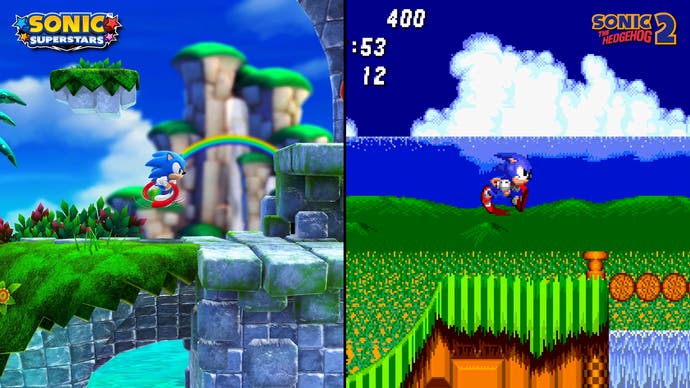
Not every mechanic is a triumph – I dislike the fog circle the follows you around through much of Speed Jungle Act 2, for instance – but others are fantastic. Take Press Factory with its hydraulic machinery slamming against the stage at fixed intervals, sending you flying if you happen to be touching the floor – this feels fresh and fun. The point is – the stage design is largely excellent which, combined with the excellent controls, makes for a faithful and fun Sonic experience.
Unfortunately, there is one big caveat that can spoil the fun – boss battles. The thing about Sonic bosses is that I’ve always felt that the best fights reward daring players. Get in there, get your hits in and win. They are just long enough to be fun while keeping the pacing brisk.
With Sonic Superstars, boss fights are both too frequent with two bosses in each act and way too drawn out, with a lengthy (but skippable) cutscene and typically long waiting periods before bosses momentarily reveal their weak points. As a result, fights can last for minutes – nearly as long as the stage itself. Some battles are actually fun and even creative, but the length means that replaying stages can be tedious and it drags the pacing of the game way down. It’s my single biggest complaint.
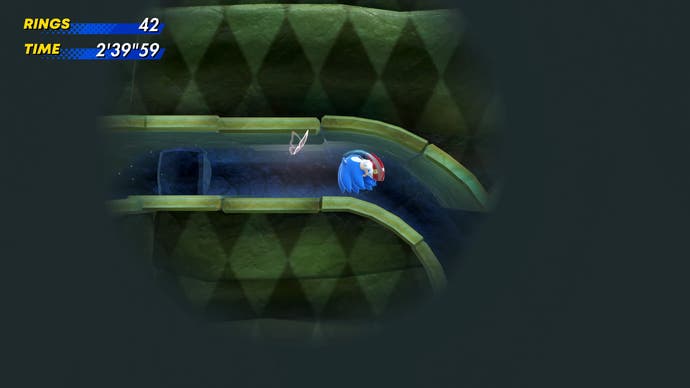
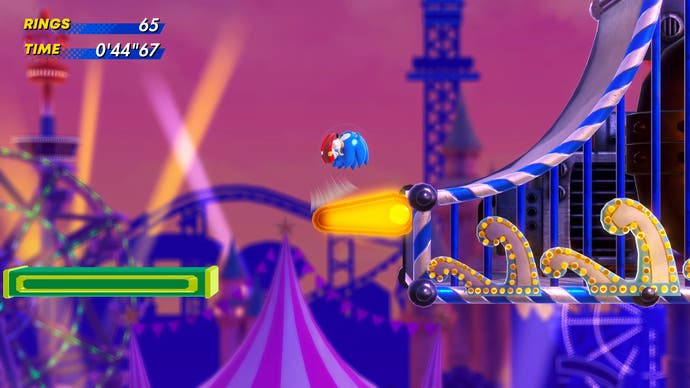
The developers have also included character-specific bonus levels, some of which are fun, others perhaps less so. There’s even multiplayer included, which didn’t do much for me and has performance implications we’ll discuss later.
In contrast to other side-scrolling Sonic installments, the core game and level design in Superstars fares well. The play mechanics largely feel excellent and authentic while most of the level designs are good to great. The boss battles and occasional level gimmicks can let you down, especially when they drag on way too long, but it’s still a proper Sonic game in a way that I didn’t expect.
That brings us to visuals and audio. Superstars is a 3D game viewed from a side perspective, with 2D movement along the X and Y axes. Unlike other post-2008 titles from Sonic Team, Superstars uses the Unity game engine rather than the internal Hedgehog Engine. Unity can be a great choice for multiplatform games, even compared to Unreal, and it allows you to have a 60fps performance target on Switch that can be scaled up on more powerful platforms.
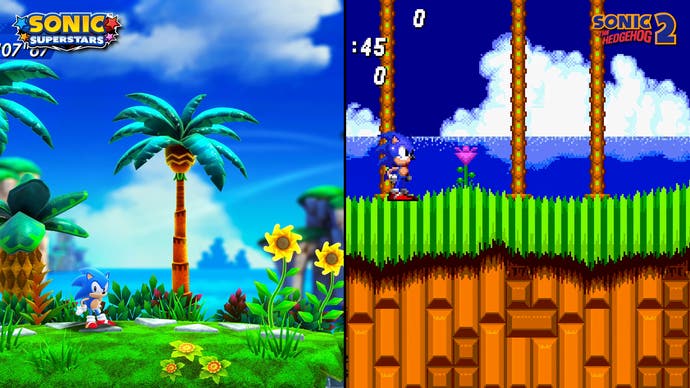
I think they’ve largely done a good job with this – the foregrounds are sharp and legible, with bold colors and clear shapes. They’re not pushing huge volumes of detailed polygons, but it works well enough and retains the classic abstract designs you expect from a side-scrolling Sonic game. The background is smarter still, with sparse geometry supplemented by background elements sporting flat tetures. The way these layers are assembled mimics the multi-layer parallax scrolling Sonic is known for, while a depth-of-field blur brings the player’s eye to the foreground to great effect.
Character rendering quality and animation are also top notch. Sonic and friends are all detailed, expressive, and well shaded. While displayed at full frame-rate, the animation matches the posing and key frames from his 2D adventures which combines well with the controls to produce a great-feeling adventure.
Unfortunately, the presentation isn’t always perfect – in some zones, the background can feel a little sparse with obvious 2D elements detracting slightly from the effect – especially in the Switch version. That brings us to the main point of comparison between the different platforms: visuals and performance.
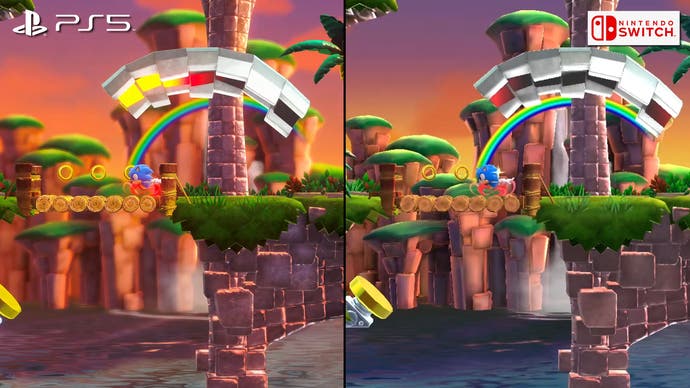
I tested the game on PS5, both Xbox Series consoles, the PC and Switch, but it’s also available last-generation machines. Based on brief testing, however, all versions except the Switch largely share the same visual quality, with the primary change centering on resolution. PS5 and Xbox Series X, for instance, deliver a full native 4K experience, while Xbox Series S is 1080p native. All versions aim for 60fps and they all use the same detail settings – save for the Switch, which makes it an interesting case study. Some of the decisions made for the Switch version make a lot of sense while others left me baffled.
I first played the game in portable mode and was impressed with the experience – it looks super vibrant and smooth on the Switch’s OLED display and even delivers a full native 720p output. Some stages render at a lower resolution, but this is fixed on a per-stage basis and doesn’t scale dynamically.
In docked mode, reality came crashing down – a lot of sacrifices were necessary to get this game to 60fps and, while I think that’s the right choice, these sacrifices have a profound impact. The 720p resolution that fits the Switch’s integrated display returns in docked mode and doesn’t scale well to a 4K screen, while texture resolution and texture filtering are cut down significantly, leaving certain levels and angles seemingly devoid of detail.
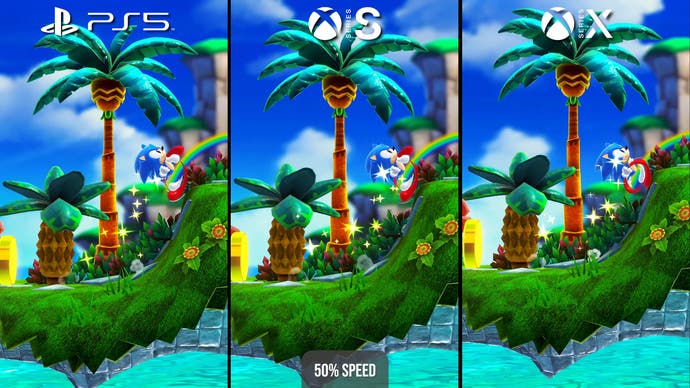
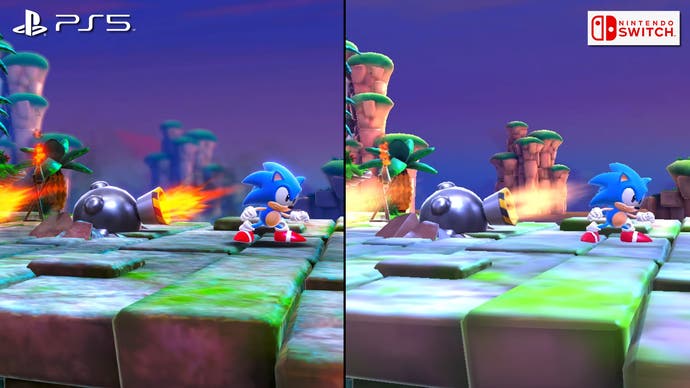
These cutbacks are made more prominent by the lack of depth-of-field background blur, which looks alright early on but can look downright ugly in some later levels. On top of this, lighting is cut way back, bloom effects are gone and things like fogging and atmospherics are absent too, making many scenes look flat and listless.
Despite all this, I still think they made the right decision to hit the 60fps target, which feels like a necessity for a Sonic title – and to its credit, the game still plays well on Switch – and in portable mode it looks pretty good too; it’s just docked mode that suffers.
The Switch is also the odd one out in terms of performance, with a basically locked 60fps on PS5 and Series X/S but more common frame-rate wobbles on Switch. (The Series S might actually have the most stable performance of any console version of Superstars, thanks to its lower 1080p resolution.) Any sequence with too many characters or objects on-screen can incur a drop, with the first half of the game being nearly perfect but performance getting worse in the later stages. Boss fight performance is also poor, with performance against some enemies struggling to clear the 50fps line. Given the visual cuts, this performance is a little disappointing and suggests the team just barely managed to hit their frame-rate target.
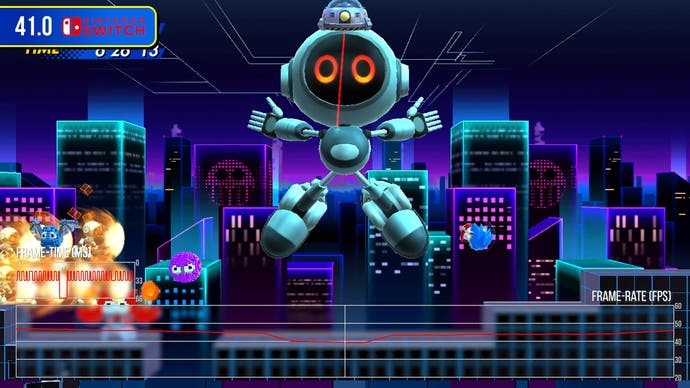
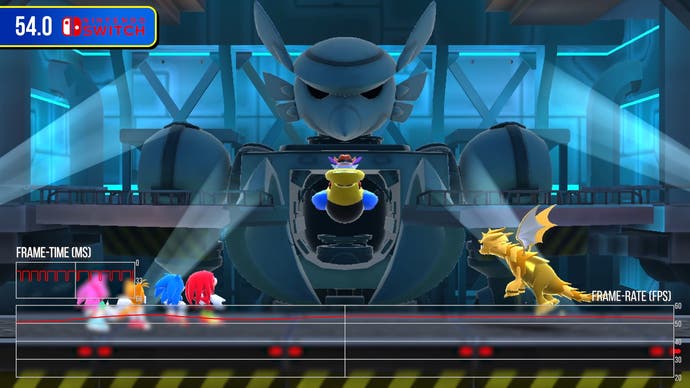
Loading is at least more universally laudable, with all SSD-based systems loading stages very quickly while Switch is significantly slower but at around a dozen seconds for a full stage it’s not unreasonable – and special stages are also relatively snappy to load in, which helps maintain the game’s flow.
The final aspect of performance to discuss is input lag, with Switch shockingly offering the most responsive console version, just ahead of PS5 but some distance ahead of both Xbox consoles, in which Sonic feels heavier and clunkier to control. Given that the menu is quite responsive, it’s just the character movement is affected, I think this is a bug that needs fixing ASAP.
For my money, the best version is the PC version, which is only the second game in Sonic history to support 120fps playback. This is a game-changer for me and results in an unbelievably smooth and responsive experience. That said, some users have noted that trying to rev the spin-dash using multiple buttons does not work properly at 120fps, which is another bug that ought to be fixed.
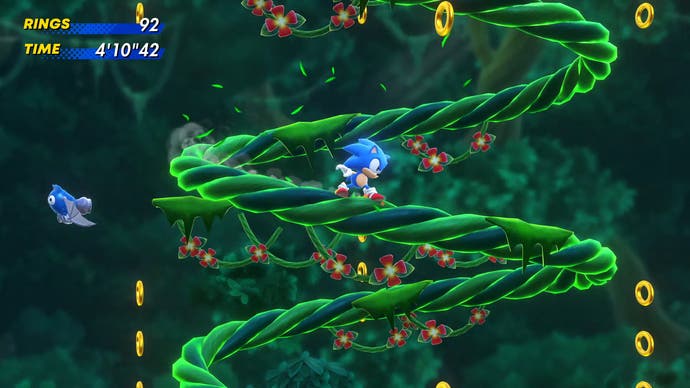
Though the PC version can offer the best performance and short loading times, its moddability is its greatest asset.
That’s because I just can’t abide some of the music in Superstars, which feels too similar to Sonic 4, with drum samples that try but fail to authentically capture the sound of the original Mega Drive games. Even climactic late-game battles are scored with short looping tracks that soured my experience overall.
It’s frustrating too, as roughly 70 percent of the soundtrack is truly top-tier, yet that remaining 30 percent just doesn’t work. Thankfully, there are pre-made packs and instructions for the PC build that swaps out the music for a different selection – one that can feel more cohesive.
The truth is I was’t feeling this game initially, but the more I’ve played and replayed stages, I’ve come to realise that I actually love playing Sonic Superstars. It’s not Sonic Mania, but this is easily the second-best official side-scrolling Sonic game to come out of Sega since the 16-bit days. It has its flaws for sure, but crucially it feels great to play and I’m so happy they finally have established solid base mechanics again.

